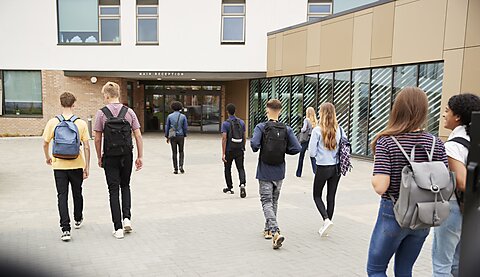Kayla Susalla
It is frequently asserted that public schools educate all students. However, students deemed at‐risk are sometimes transferred to alternative schools, also known as Alternative Education Campuses (AECs). AECs are understudied, yet existing data pose concerns for the outcomes and practices of the students they serve.
In the 2021–22 school year, over half‐a‐million students were enrolled in ACEs. ACEs are public schools commonly serving students deemed at risk of educational failure. Habitual suspensions, risk of expulsion, poor grades, substance abuse, truancy, pregnancy, or other challenging circumstances may result in a referral from a traditional public school, though students can also transfer voluntarily. Referral to an AEC is at the discretion of the traditional public school, and assignment can be temporary or permanent.
A survey conducted by the National Center for Education Statistics (NCES) found a majority of teachers in AECs are hired directly to teach in such schools, but teachers can also transfer voluntarily and involuntarily from traditional public schools. AECs can focus on behavioral issues, credit recovery, or offer specific pedagogical approaches, though others may serve as a broader alternative for students in traditional public schools. Charter schools, as well as private schools contracted by school districts, can serve as AECs.
AECs can play a pivotal role in the trajectory of a child’s education. Individualized learning plans, lower teacher‐student ratios, and flexibility in format are a few of the assets AECs can possess. However, there is concern that traditional public schools refer underperforming or difficult students to AECs to evade low graduation rates, and disproportionately transfer minority students.
A Government Accountability Office (GAO) report highlights the disparities in demographics and disciplinary actions of students who attend AECs. The GAO found in the 2015–2016 school year that Hispanic boys, black boys and girls, and boys with disabilities had higher enrollment shares in disciplinary alternative schools than in non‐alternative schools. Additionally, the report noted, “in every district GAO visited, officials said students had experienced multiple types of trauma, such as gang violence, death of schoolmates or parents, poverty, or homelessness.”
In comparing disciplinary measures in alternative schools between the 2013–14 and 2015–16 school years, the report found disabled students experienced a 17 percent increase in occurrences of corporal punishment. Black students experienced an increase in corporal punishment, as well as in‐school suspensions, school‐related arrests, and referrals to law enforcement, while White and Hispanic students had a decrease in all types of discipline.
It is concerning if traditional public schools are referring at‐risk students to schools designed to address behavioral or academic problems, and if in those schools harsh disciplinary measures like suspensions, law enforcement interventions, and corporal punishment are in widespread use. Such policies push kids, who are already struggling in and outside of school, further behind academically and can potentially re‐traumatize them.
Preceding that, discretionary referrals may be influenced by conscious or unconscious bias, and may contribute to disproportionate referrals for specific groups of students.
Research evaluating outcomes of students who attend an AEC is scarce, but what exists is not encouraging. As seen in the graphs below, graduation rates tend to be extremely low compared to traditional public schools, as well as proficiency in math and language arts.
These results notwithstanding, some research suggests AECs produce generally positive outcomes. But it is unclear if such outcomes are due to lowered standards for AEC students, or effective practices.
A meta‐analysis found a small positive effect on school performance, attitude, and self‐esteem, suggesting students enjoy attending AECs. But it found no effect on juvenile delinquency. Wilkerson et al. discovered students in academic‐remediation alternative schools earned more credits versus students attending a traditional public school that fit the alternative school attendance criteria. This despite having lower attendance rates.
Wilkerson et al. noted some academic‐remediation alternative high schools allowed students to graduate with fewer credits compared to the traditional public schools they would have attended. Lowering requirements pushes kids through the system, possibly leaving them unprepared after graduation, and defeating the purpose of education.
The study also found alternative schools were associated with increased suspensions, but fewer office discipline referrals, suggesting alternative schools are quicker to use exclusionary discipline.
Clear guidelines on what justifies a referral to an alternative school are vital to mitigate subjective procedures and potentially discriminatory practices. Additionally, if AECs are using harsh disciplinary measures and leaving kids unprepared, students should not be forced into schools potentially causing more harm. Ultimately, policies should allow funding to follow students to freely selected institutions fitting their unique needs.










